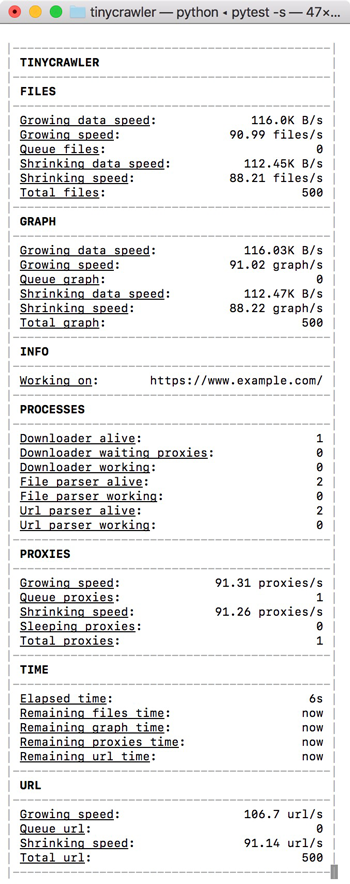Small customizable multiprocessing multi-proxy crawler.
Project description
An highly customizable crawler that uses multiprocessing and proxies to download one or more websites following a given filter, search and save functions.
REMEMBER THAT DDOS IS ILLEGAL. DO NOT USE THIS SOFTWARE FOR ILLEGAL PURPOSE.
Installing TinyCrawler
pip install tinycrawlerPreview (Test case)
This is the preview of the console when running the test_base.py.
Usage example
from tinycrawler import TinyCrawler, Log, Statistics
from bs4 import BeautifulSoup, SoupStrainer
import pandas as pd
from requests import Response
from urllib.parse import urlparse
import os
import json
def html_sanitization(html: str) -> str:
"""Return sanitized html."""
return html.replace("WRONG CONTENT", "RIGHT CONTENT")
def get_product_name(response: Response) -> str:
"""Return product name from given Response object."""
return response.url.split("/")[-1].split(".html")[0]
def get_product_category(soup: BeautifulSoup) -> str:
"""Return product category from given BeautifulSoup object."""
return soup.find_all("span")[-2].get_text()
def parse_tables(html: str, path: str, strainer: SoupStrainer):
"""Parse table at given strained html object saving them as csv at given path."""
for table in BeautifulSoup(
html, "lxml", parse_only=strainer).find_all("table"):
df = pd.read_html(html_sanitization(str(table)))[0].drop(0)
table_name = df.columns[0]
df.set_index(table_name, inplace=True)
df.to_csv("{path}/{table_name}.csv".format(
path=path, table_name=table_name))
def parse_metadata(html: str, path: str, strainer: SoupStrainer):
"""Parse metadata from given strained html and saves them as json at given path."""
with open("{path}/metadata.json".format(path=path), "w") as f:
json.dump({
"category":
get_product_category(
BeautifulSoup(html, "lxml", parse_only=strainer))
}, f)
def parse(response: Response):
path = "{root}/{product}".format(
root=urlparse(response.url).netloc, product=get_product_name(response))
if not os.path.exists(path):
os.makedirs(path)
parse_tables(
response.text, path,
SoupStrainer(
"table",
attrs={"class": "table table-hover table-condensed table-fixed"}))
parse_metadata(
response.text, path,
SoupStrainer("span"))
def url_validator(url: str, logger: Log, statistics: Statistics)->bool:
"""Return a boolean representing if the crawler should parse given url."""
return url.startswith("https://www.example.com/it/alimenti"")
def file_parser(response: Response, logger: Log, statistics):
if response.url.endswith(".html"):
parse(response)
seed = "https://www.example.com/it/alimenti"
crawler = TinyCrawler(follow_robots_txt=False)
crawler.set_file_parser(file_parser)
crawler.set_url_validator(url_validator)
crawler.load_proxies("http://mytestserver.domain", "proxies.json")
crawler.run(seed)Proxies are expected to be in the following format:
[
{
"ip": "89.236.17.108",
"port": 3128,
"type": [
"https",
"http"
]
},
{
"ip": "128.199.141.151",
"port": 3128,
"type": [
"https",
"http"
]
}
]License
The software is released under the MIT license.
Project details
Release history Release notifications | RSS feed
Download files
Download the file for your platform. If you're not sure which to choose, learn more about installing packages.
Source Distribution
tinycrawler-1.7.5.tar.gz
(16.2 kB
view details)
File details
Details for the file tinycrawler-1.7.5.tar.gz.
File metadata
- Download URL: tinycrawler-1.7.5.tar.gz
- Upload date:
- Size: 16.2 kB
- Tags: Source
- Uploaded using Trusted Publishing? No
- Uploaded via: Python-urllib/3.6
File hashes
| Algorithm | Hash digest | |
|---|---|---|
| SHA256 |
18059f7ada5aea225777f72dd3b119d44cc24ebc9174f0a09e4fbb41f141a517
|
|
| MD5 |
f2221d0c2ca4962d62504ebceadc6312
|
|
| BLAKE2b-256 |
c2f74d10a49ea78f4c4c7ceab208c3d67fd60ad8436c02d636bf8ef3baafc40f
|


















